About 71 percent of the Earth’s surface is covered in water, so it is only natural that there is a photography competition dedicated to celebrating 71 percent of the world’s natural splendor.
Yep, the Underwater Photographer Of The Year Contest has just now announced its winners for the year 2021 and the pictures are absolutely breathtaking. The competition celebrates all things underwater, whether it’s oceans, seas, lakes, rivers, or any other pool of water.
First, second, and third place winners as well as a slew of honorable mentions were selected across 14 photographic categories. Renee Capozzola, SJ Alice Bennett, Mark Kirkland, Karim Iliya, and many others were in the 1st place spotlight across the various categories, captivating with their winning photographs.
Bored Panda has gathered the top winners from each category and compiled a list for you to enjoy. While you’re scrolling through the fascinating winning photographs, go ahead and vote and comment on the ones you enjoyed the most!
#1 ‘Sharks’ Skylight’ By Renee Capozzola (United States), 1st Place In ‘Wide Angle’
“This image was taken in French Polynesia, which happens to be one of my very favorite places to photograph sharks. Here, there are strong legal protections in place for sharks, allowing them to thrive and help balance the marine ecosystem. During this visit to Moorea, French Polynesia, I spent several evenings in the shallows at sunset, hoping to capture something unique. Instead of focusing on split-level images as I often like to do, I decided to try something different. I envisioned and aimed to capture the sharks underwater with the sunset seen through Snell’s window. It took many attempts, but on this one particular evening, the water was calm, the sunset was vibrant, and I got extremely lucky with the composition as well. Since many shark species are threatened with extinction throughout the world, it is my hope that images of these beautiful animals will help promote their conservation.”
Moorea, French Polynesia
Canon, 5D Mark III, Nauticam, Canon 11-24mm f/4, iso 400, f20, 1/200, Dual Sea & Sea YS-D2’s
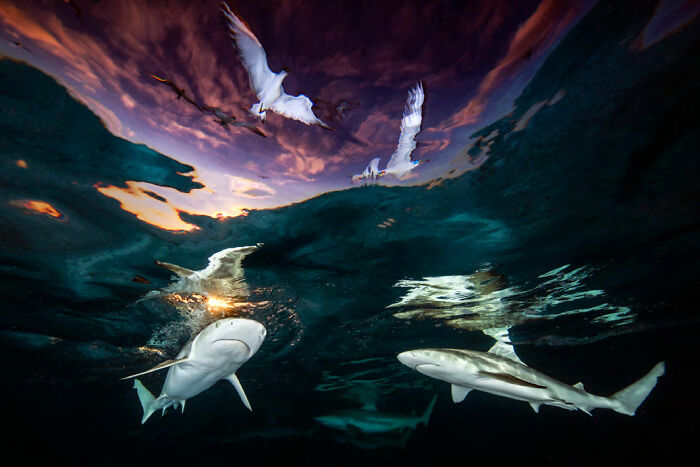
Image credits: Renee Capozzola
#2 ‘Pontohi Pigmy Seahorse’ By Galice Hoarau (Norway), 1st Place In ‘Macro’
“Pontohi pygmy seahorse (Hippocampus pontohi) is one of the smallest and most recently discovered seahorses. They usually live on reef walls and can be hard to find. We had found two during the morning dive so I decided to dedicate the afternoon to getting a backlit photo. We were lucky to find this particular individual hanging out from the wall, allowing the use of a snoot to backlight it with the help of Rando, my dive guide. After setting up the camera and strobe we had to wait for it to get used to us and finally turn toward the camera for a brief moment.”
Siladen, Indonesia
Olympus , E-M1 II, Nauticam, 60mm macro, iso 200, f22, 1/160, Backscatter mini flash + snoot
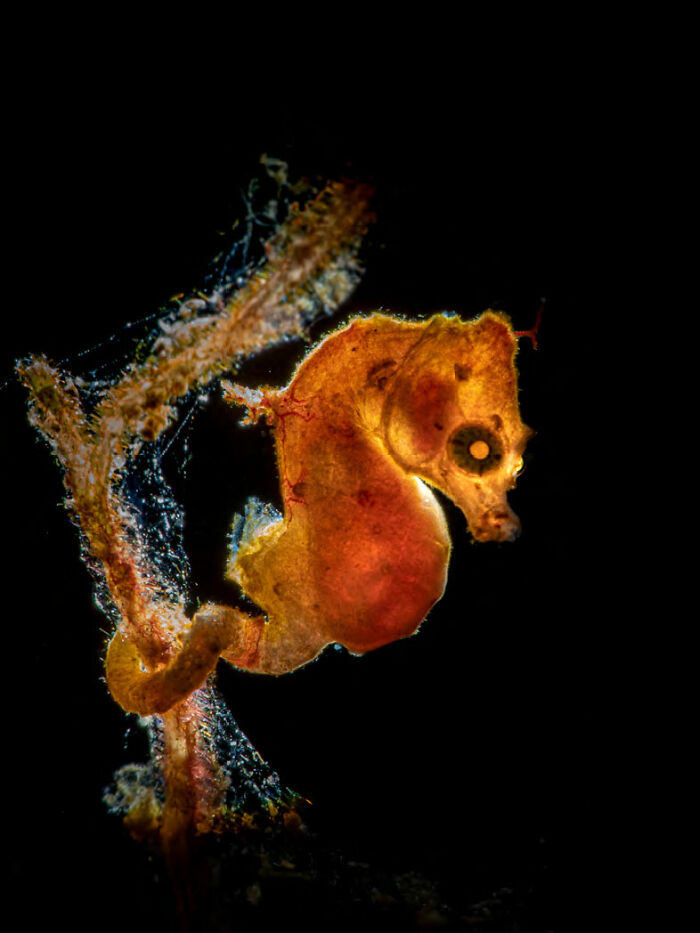
Image credits: Galice Hoarau
#3 ‘Double Turtle’ By Renata Romeo (Italy), 3rd Place In ‘Black & White’
“During the long months of the pandemicI had to revise, like everyone else, my usual way of life and had to replace the usual diving with snorkeling and this activity surprisingly gave me new time and space, interesting perspectives and different points of view. It gave birth to my life in a time of shadows. This summer, snorkeling very early in the morning in Marsa Egla, I often met the smaller and friendly hawksbill turtle of the bay. Enchanted by its elegant movements, I watched it for hours eating and breathing.”
“I noticed that particular conditions of light and sea made perfect the reflection of its being on the surface. For days I have been waiting patiently for that favorable situation and that its figure could be captured in a photo as I imagined it: a perfect moment of freeze its geometries in the light reflected on the surface.”
Marsa Egla, Marsa Alam, Egypt (MBY)
Canon , 90D, Easydive Leo3, Tokina 10-17, iso 160, 8, 250, natural light

Image credits: Renata Romeo
#4 ‘Trying In’ By Sj Alice Bennett (Mexico), 1st Place In ‘Up & Coming’, Most Promising British Underwater Photographer
“As this shot was taken during cavetraining, we had a pretty intricate plan in place, which is not usually how I run cave shoots. However, the plan failed miserably as the cave student, Max, had multiple equipment failures. Plans are important, but when they fail you need to adapt quickly and deal with a new situation. After fixing all the issues on the surface and changing our plan to accommodate our now fairly depleted gas supplies, we descended again. I swam ahead and waited just beyond the beginning of the permanent mainline watching the team swim towards me, followed closely by the lighting assistants creating those beautiful halo effects. Suddenly everything just lined up perfectly, so I pressed the shutter just as Max turned to tie into the mainline.”
Cenote Mayan Blue, Sistema Ox Bel Ha, Tulum, Mexico (MBY)
Sony, a7S II, Nauticam NA-A7II , Sony FE 24- 70mm f/2.8 GM, iso 2500, f/2.8, 1/125, Big Blue Video Lights, 30k, 2 x 15k, 2 x 4k lumen

Image credits: SJ Alice Bennett
#5 ‘Sunrise Mute Swan Feeding Underwater’ By Ian Wade (United Kingdom), 1st Place In ‘British Waters Compacts’
“I decided to attach a small weight to the back of my GoPro and threw it into the lake a short distance from me. The small weight would mean the GoPro always fell on its back, so I could shoot at an almost vertical angle. I have connected the GoPro to my Phone so I could remotely fire off images.”
“The GoPro hitting the water had attached the swan’s interest and they swam over. I waited until one of the swans was in the correct position and with its head underwater and shot a high-speed burst of images enabling me to capture this picture.”
St Georges Park – Bristol, United Kingdom (MBY)
GoPro , HERO3+ Black Edition, f/2.8, iso 100, f2.8, 1/433, Natural lighting
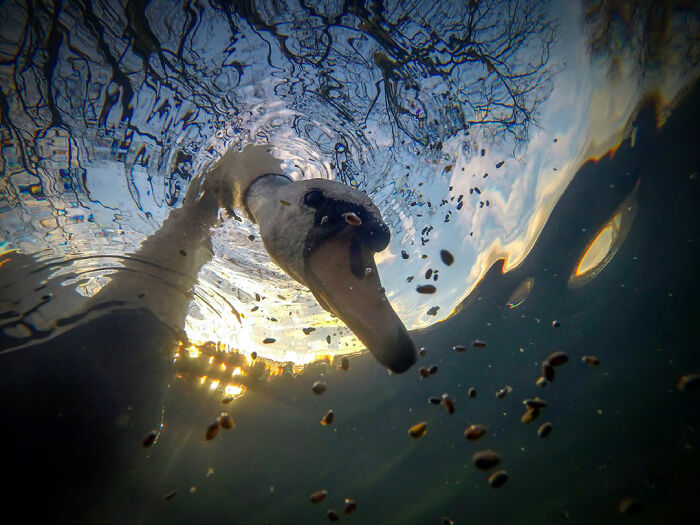
Image credits: Ian Wade
#6 ‘Grey Seal Gully’ By Kirsty Andrews (United Kingdom), 3rd Place In ‘British Waters Wide Angle’
“Grey seals are wonderful to photograph but I particularly like this shot because of the background. My buddy showed me this pretty gully full of dead man’s fingers and light coming down through kelp. I waited there for a little while, hoping a seal would turn up. In the end I only had one quick pass from one shy seal, but I was able to take this pleasing portrait.”
Farne Islands, Northumberland, UK
Nikon, D500, Nauticam NA D500, Tokina 10-17mm, iso 200, f11, 1/160, 2x Retra pro strobes
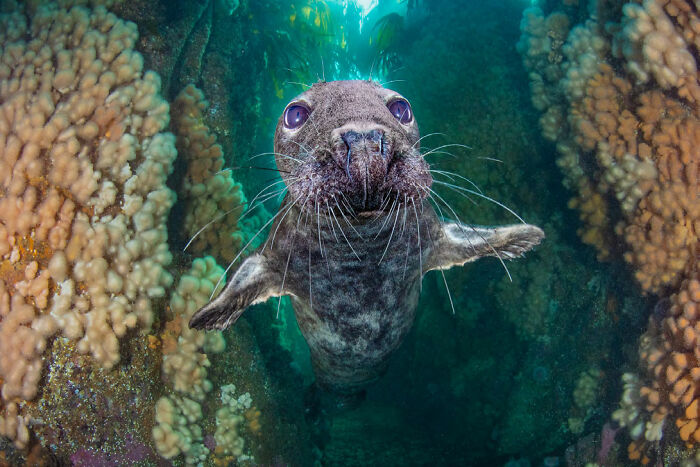
Image credits: Kirsty Andrews
#7 ‘Nest Buddies’ By Dan Bolt (United Kingdom), 3rd Place In ‘British Waters Macro’
“The corkwing wrasse you can see in the background was actually busy building a nest under the pier. This means he was very distracted by his duties and would regularly come back to the same spot to add more gathered pieces of seaweed.”
“The nudibranch had been making its way along a near-by piece of kelp, and I only had to wait for a minute or two before it made its way up a seaweed stump enabling me to grab a few shots just at the moment when wrasse and nudibranch were both in frame.”
Swanage pier, UK
Olympus, OM-D E-M1, Aquatica AE-M1, Olympus 60mm macro, iso 320, f/14, 1/250, 2 Sea & Sea YS-D1
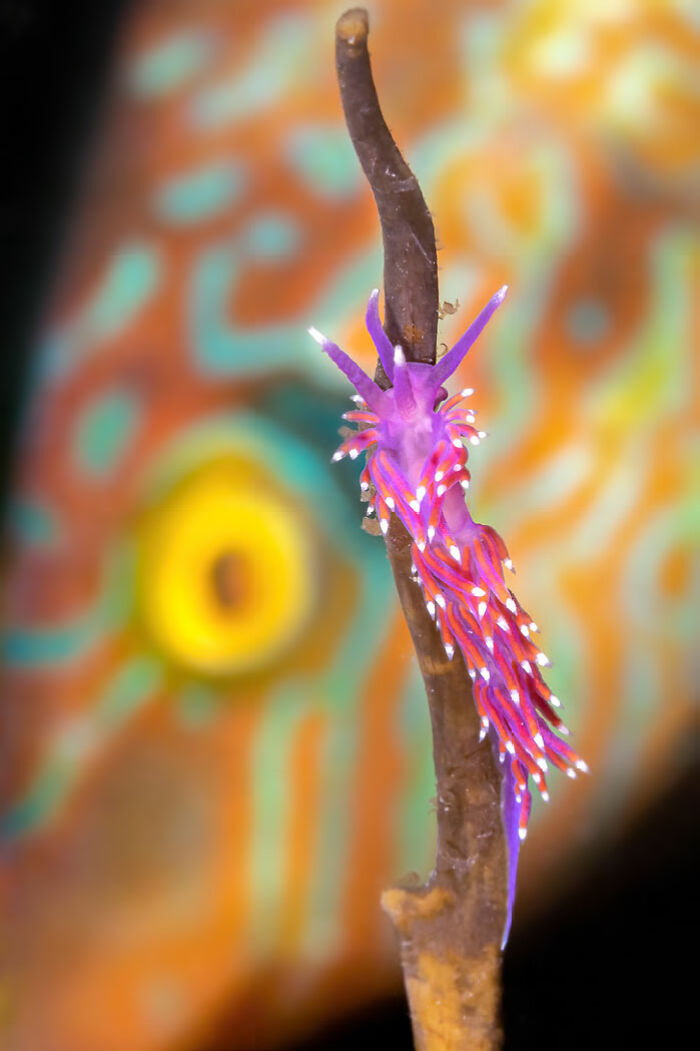
Image credits: Dan Bolt
#8 ‘River Of Blood From A Dead Sperm Whale’ By Rafael Fernandez Caballero (Spain), 3rd Place In ‘Marine Conservation’
“Seeing a dead animal is always sad. But seeing a big mammal dead like this sperm whale, it is something indescribable.”
“From land the image was terrifying. But when I flew the drone the situation was even more shocking and dramatic. There
was an incredibly large river of blood, maybe longer than a mile, coming out of the sperm whale.”
Baja California Sur, Mexico, Spain
Dji, Mavic air, iso 100, f/2.8, 1/230
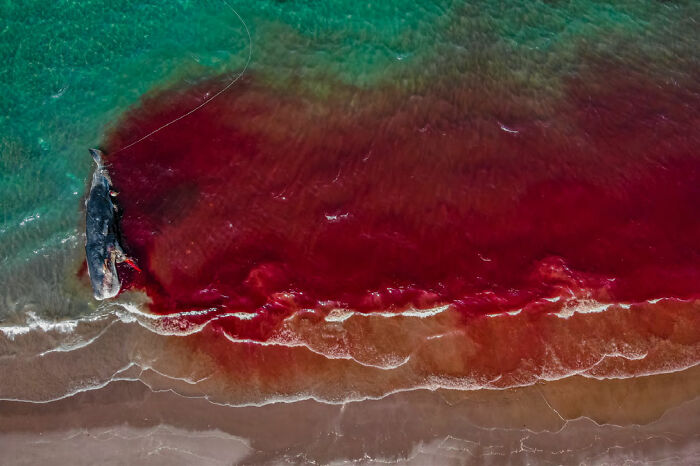
Image credits: Rafael Fernandez Caballero
#9 ‘Bowlander’ By Tobias Friedrich (Germany), 1st Place In ‘Wrecks’
Due to bad weather at Tiger Beach and in Bimini we had to look for shelter near Nassau in the Bahamas and do some regular dives. This wreck was totally new to me and a big surprise when we descended as the bow is hanging almost completely over a sandy overhang.
Nassau, Bahamas
Canon, EOS 1DX Mark II, SEACAM Silver, Canon 8-15mm Fisheye, iso 200, 7.1, 1/160, SEACAM Seaflash 150D
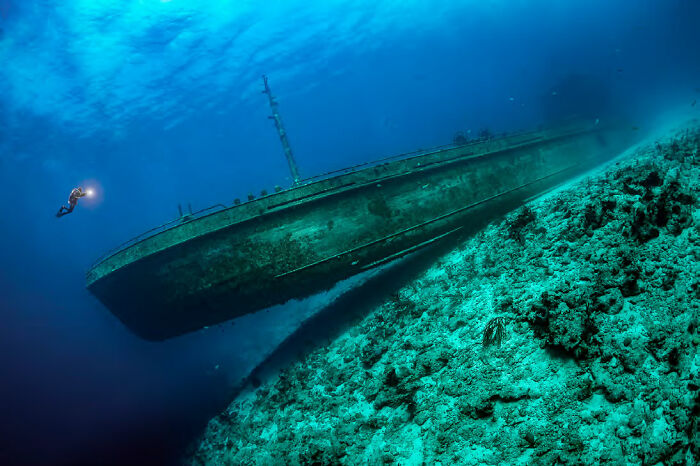
Image credits: Tobias Friedrich
#10 ‘Portrait Of A Variable Blenny’ By Malcolm Nimmo (United Kingdom), 1st Place In ‘British Waters Macro’
“The variable blenny (Parablennius pilicornis) is a relatively new arrival to UK coastal waters, with its origins from more southerly waters (it has been recorded throughout the Mediterranean Sea). This species may appear in a number of different colour forms. The current image is of a male and was taken in Plymouth Sound, July 2020. This particular blenny was standing out proud on a reef ledge, making it an ideal subject. The image was captured using snooted lighting to emphasise only the face of the blenny, with the snooted light being positioned from above the head enhancing the facial features.”
Plymouth Sound, United Kingdom (MBY)
Nikon, D7200, Nauticam, Nikon 60mm , iso 200, f/13, 1/80, Inon 240 strobe with a Flip snoot pro
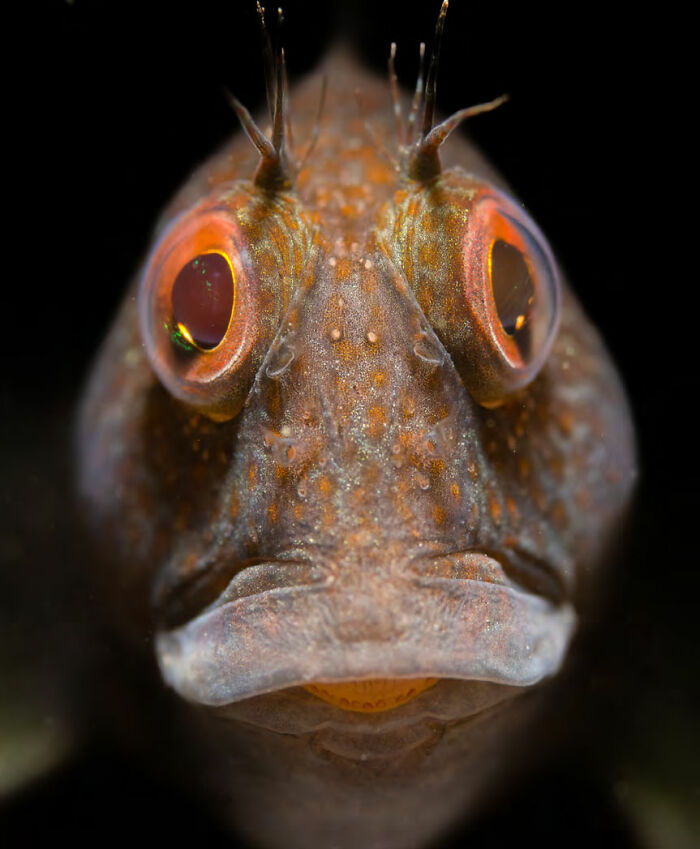
Image credits: Malcolm Nimmo
#11 ‘Gothic Chamber’ By Martin Broen (United States), 2nd Place In ‘Wide Angle’
“The riviera Maya in Mexico host the world’s largest underground river systems filled with clear water, never-ending tunnels and amazing halls with decoration that can compete with the best gothic cathedrals of the world.”
“The challenge of capturing this beautiful hall in cenote Monkey Dust was not only the huge dimensions but the fact that is pitch black.”
“This photo is a x6 shot horizontal panorama stitching captured at 1/15 sec handheld at the usable limit of the camera ISO and diaphragm wide open to create an 86mpx panorama. My aim was to capture the scale, the tridimensionality of it, the richness of theformations and their incredible textures.”
Cenote Monkey Dust, Mexico
Sony, A7RIII, Nauticam NA-A7III, Canon 8-15mm at 15mm, iso 6400, f/4.5 , 1/15, Big Blue 15000 lumen
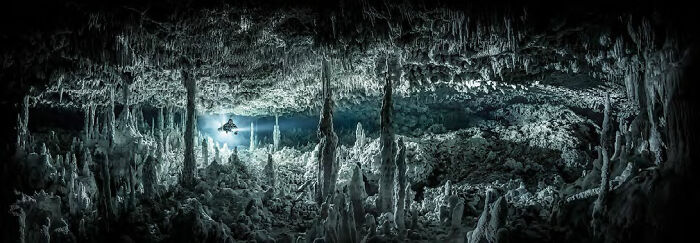
Image credits: Martin Broen
#12 ‘Reclaimed By The Ocean’ By Grant Thomas (United Kingdom), 2nd Place In ‘Wrecks’
“It was late in the day and the sun was setting over the arid landscape of Jordan’s southern most city, Aqaba. Myself and a group of underwater photographers were all waiting eagerly for night time to come so that we could enter the water and begin to explore the huge array of military hardware which has been purposely sunk for divers to enjoy. We decided to use a combination of powerful off-camera lights to ‘spot light’ the tank (M42 duster) and back light a diver, which helped eliminate any distracting elements in the background. Creating this image was a team effort andI I have to say a huge thank you to the entire Diverse Divers team for making it happen.”
Aqaba, Jordan
Canon, 5d mkiv, Ikelite housing, Canon 8 – 15mm fisheye , iso 2000, f/8.0, 1/30, Combination of different video lights
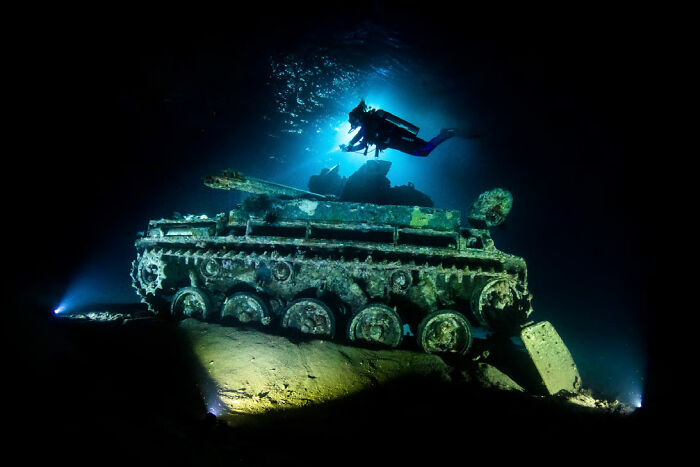
Image credits: Grant Thomas
#13 ‘The Great Migration’ By Mark Kirkland (United Kingdom), 2nd Place In ‘British Waters Wide Angle’
“It’s the microscopic plankton which draws the massive Basking Shark up the west coast of Britain and into the narrow channel between the Isles of Coll and Tiree. While their migration is predictable, to share the water with them still requires that element of luck and to spend a late summer evening with them (in 2020 of all years) was a dream. I’ve photographed Basking Sharks before and never managed that classic ‘head-on’ shot, so decided to try for something completely different instead. With challenging lighting conditions and plankton rich waters, I wasn’t sure if it could be done but after two years of planning, an experimental 19-inch dome (frame made by my brother – thanks Paul), trial and error with lenses and ND filters, and of course – the arrival of Sharks – I finally had the chance to find out.”
Isle of Coll, Inner Hebrides, Scotland
Olympus, OMD Em5 MKii, Olympus PT-EP13, Olympus 9-18mm , iso 1600, f6.3, 1/200, Natural
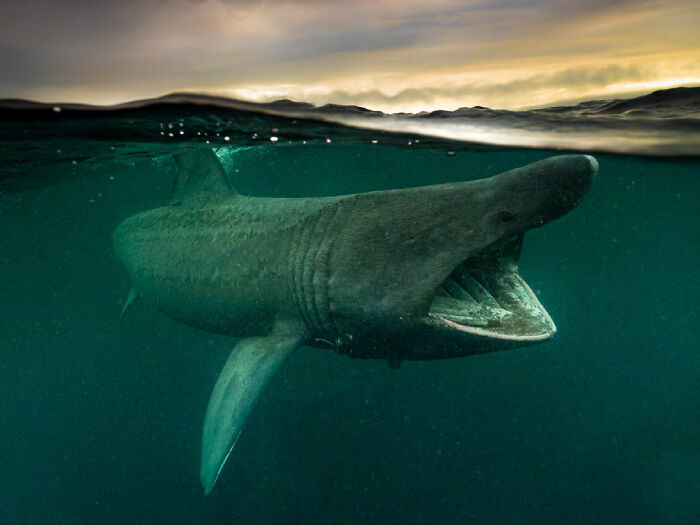
Image credits: Mark Kirkland
#14 ‘Milk Feeding’ By Mike Korostelev (Russian Federation), 3rd Place In ‘Behaviour’
“On this day a family of 13 Sperm Whales allowed me to stay with them the whole day. It is a big honour for this human to be with whales in their habitat in the ocean. These whales probably remember whaling years ago but they forgive us. At the end of the day one mother starts to feed her calf just meters from me. I froze and didn’t move. It was incredible to see such a private moment.”
Indian Ocean, Indian Ocean
Canon , 5D Mark IV, SeaCam, canon 8-15mm 4f l fisheye, iso 1000, f/4, 1/640, No
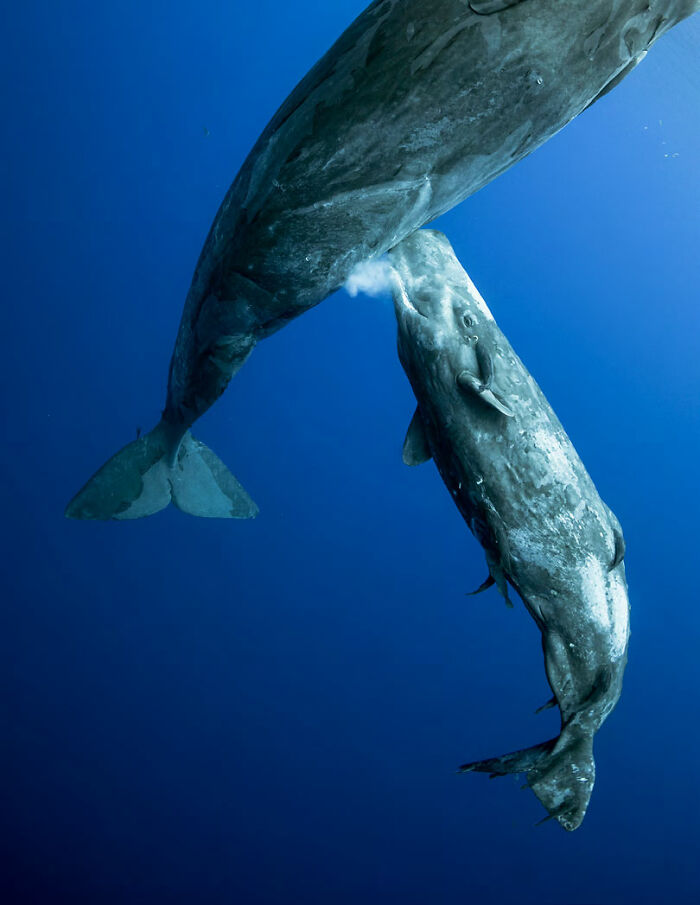
Image credits: Mike Korostelev
#15 ‘Keeper Of The Seven Keys’ By Ryohei Ito (Japan), 1st Place In ‘Portraits’
“As the Asian sheepshead wrasse grows older, it changes sex from female to male and at the same time it develops a large lump on its head. I thought about the lighting and composition so that the image of the bump and the powerful face could be conveyed, and challenged many times. He lives in a shrine under the water and looks just like a guardian deity. I would like to thank my teacher, Keigo Kawamura, for teaching me how to take underwater pictures,and Hiroyuki Arakawa who guided me.”
Tateyama , Chiba Prefecture, Japan (MBY)
Canon, 5D Mark4, SEA & SEA MDX-5D MARK 4, EF8-15mm F4L fisheye USM, iso 200, f22, 1/200, RETRA FLASH PRO x2
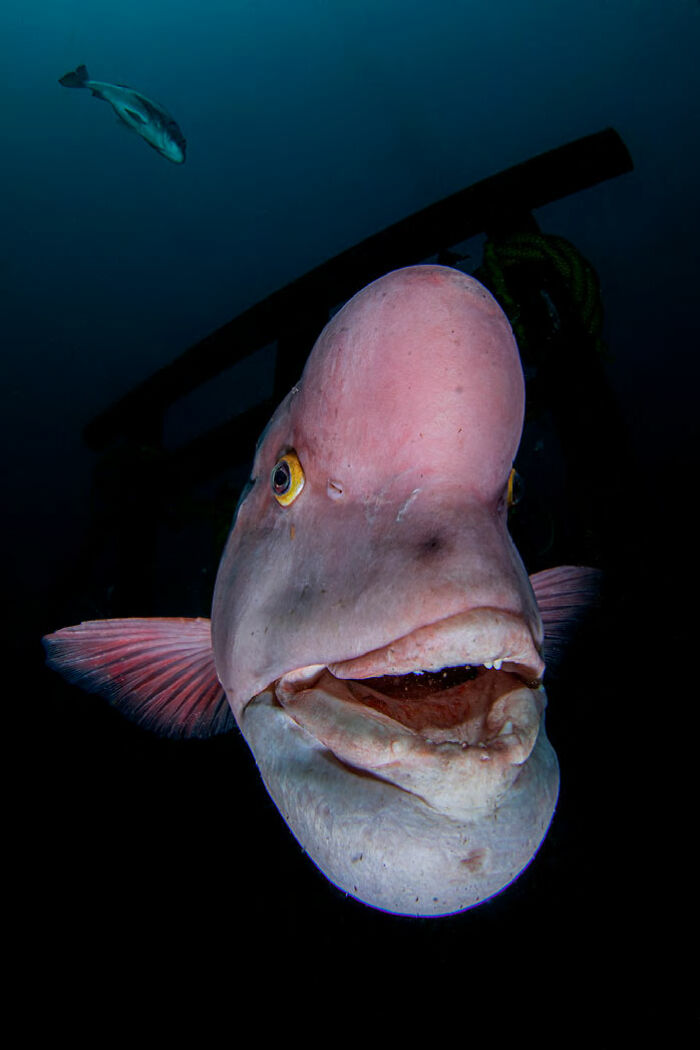
Image credits: Ryohei Ito
#16 ‘The Cut’ By Diana Fernie (Australia), 1st Place In ‘Black & White’
“This photograph was taken at Leru Cut in the Solomon Islands. I was lucky enough to have won a 10-day trip on the Solomons PNG Master liveaboard and was very excited to have the opportunity to visit this site again. Having dived these waters on two previous occasions I knew what to expect. However, I needed an elegant model as an essential element for this composition and my immediate companions could not be classified in any way as elegant! Fortunately, there was another photographer in my dingy group whose beautiful model wife was the perfect subject. Somewhat cheekily I managed to capture a few shots of her as she posed for her husband!!!”
Leru Cut, Solomon Islands
Nikon, D850, Isotta D850, Nikkor 8-15mm, iso 1250, f/4.5, 1/125, Inon Z330 X 2
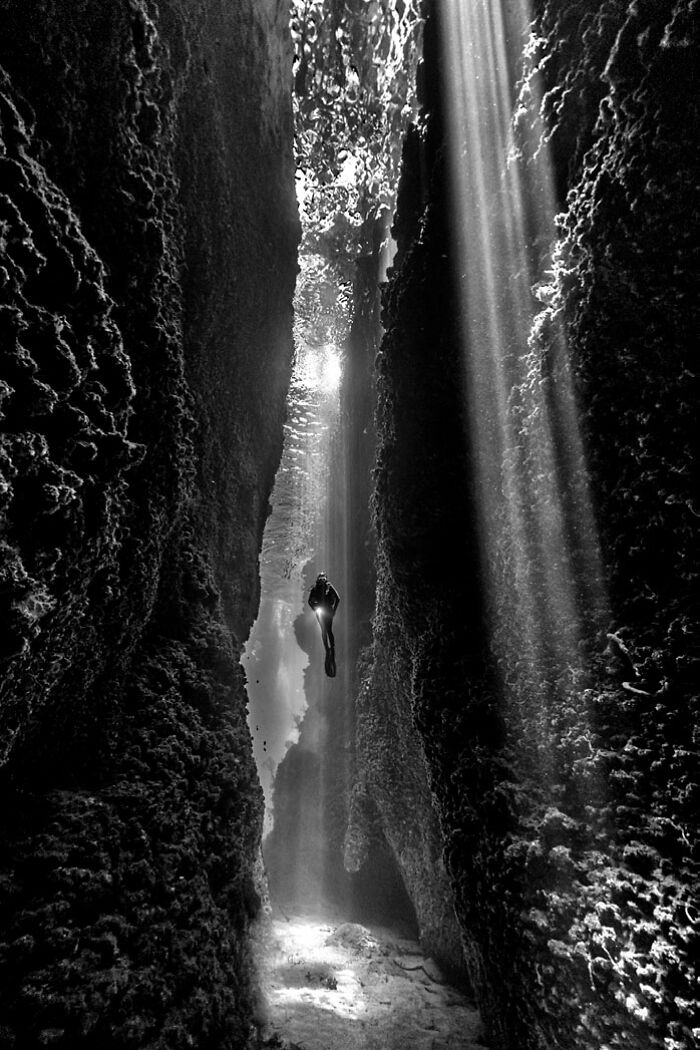
Image credits: Diana Fernie
#17 ‘SS Hispania’ By Kirsty Andrews (United Kingdom), 1st Place In ‘British Waters Living Together’
“The UK in my view has some of the finest wreck diving in the world, and the SS Hispania in the Sound of Mull is one of my favourites. This wreck truly has become an artificial reef: the wreck attracts the wildlife and both wreck and wildlife attract the divers. Every inch of metal is covered in anemones, seaweeds or sponges, orange and white. My buddy was investigating the superstructure above a row of portholes and I moved back, shooting as wide as I could to try to give a sense of scale within this colourful scene.”
Sound of Mull, Scotland, UK
Nikon, D500, Nauticam NA D500, Tokina 10-17mm, iso 800, f11, 1/80, Sea & Sea YS-110a x 2

Image credits: Kirsty Andrews
#18 ‘Face To Face’ By Jinggong Zhang (China), 2nd Place In ‘Behaviour’
“This is a picture of blenny in a fight. It is a species of chaenopsid blenny found around Japan and South Korea. Its most distinctive feature is its very cool hairstyle, which is often referred to as Punk Blenny or Mohican Blenny. In fact, this kind of Blenny fight scene is very rare because they usually just stay in their lair and don’t interact with other individuals. But during the breeding season, if an area is too densely populated, the blenny will engage in fierce fights for a mate, and these fights are often quickly settled.”
“Blenny is one of my favorite projects. From getting information to the long waiting and searching, it took me about three years intermittently to shoot this scene. I would like to thank my Japanese friends who have helped me in this process. At the same time, I am very honored to share this charming moment.”
Minabe, Wakayama, Japan
Nikon, D850, Nauticam NA D850, Nikon 105mm macro, iso 320, f/22, 1/250, Retra Flash PRO with Retra LSD
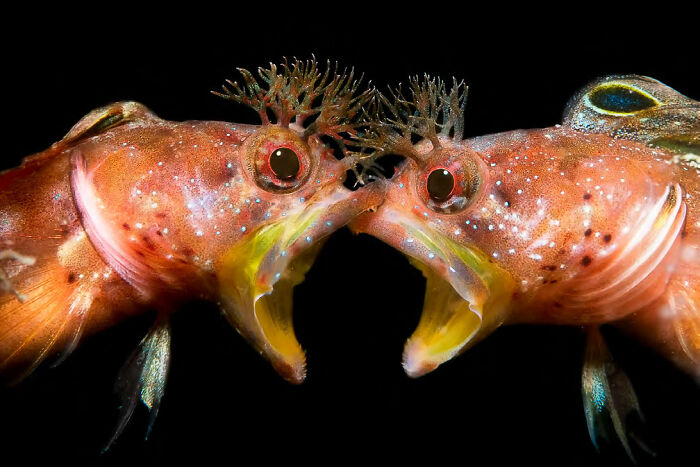
Image credits: JingGong Zhang
#19 ‘Time Travel’ By Martin Broen (United States), 2nd Place In ‘Black & White’
“Imagine yourself in an underwater cave in Mexico, hours away from the exit to surface, diving through a never ending labyrinth covered with prehistoric formations, seeing charcoal in the ground from the fires of an ancient culture, finding bones of animal species extinct 8000 years ago, and everything around you is preserved as it was back in the time those caves flooded. It’s a visceral feeling of going back in time to a different age.”
“This image is trying to capture that. The rugged texture of those prehistoric overhead environments with pristine formations framing the diver in darkness. The depth of the never-ending tunnels and the feeling of the travel in time given by the zooming movement into the light and model. And the processing in black and white to simplify the image.”
“A claustrophobic feeling for some and of discovery and adventure for others”
Cenote Chan Hol (Litte Hole), Mexico
Sony, A7RIII, Nauticam NA-A7III, Canon 8-15mm at 15, iso 5000, f/5.0, 1/10 sec, Big Blue 33000 lumen
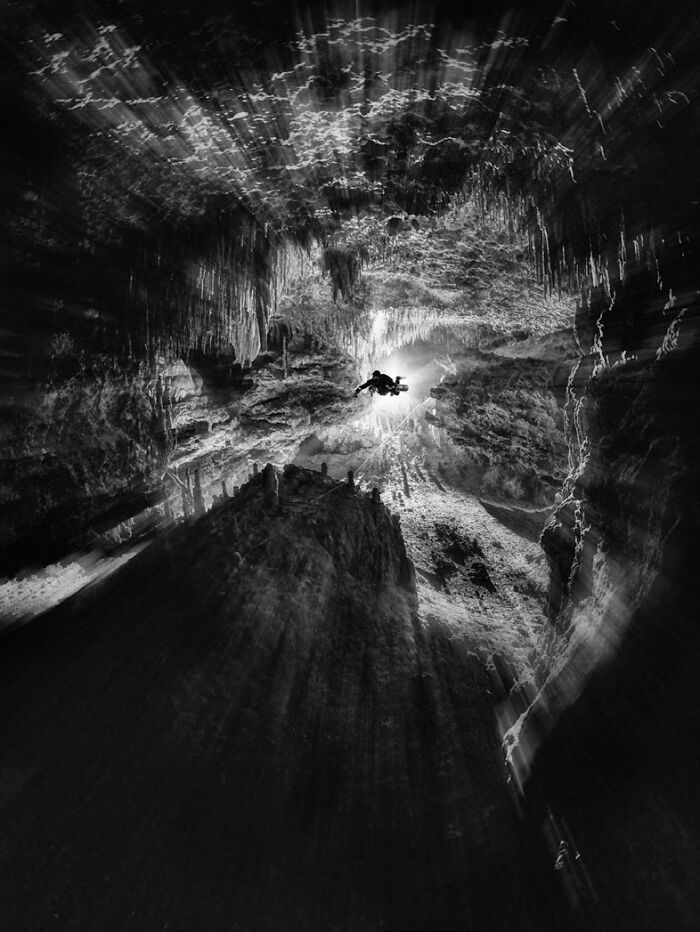
Image credits: Martin Broen
#20 ‘The Yellow Candy’ By Pasquale Vassallo (Italy), 2nd Place In ‘Marine Conservation’
“During one of my trips to the sea, I noticed a strong presence of these yellow nets closed like “candy”. I could not understand their purpose. In the following days, with the help of some local fishermen, I discovered that the candy is the heart of a trap. It is filled with dead fish and inserted into another net. Thanks to the smell of the remains of dead fish, it attracts some small molluscs – to be precise Nassarius mutabilis – that once they enter the trap they are unable to get out. Once the contents of the trap have been recovered, the candy is often abandoned in the sea, causing plastic pollution and, as visible in the shot, a trap for other organisms.”
Campi Flegrei, Italy
canon, 5d sr, SEACAM 5D, 8-15 lens, iso 125, f/16, 1/60, ONE UW
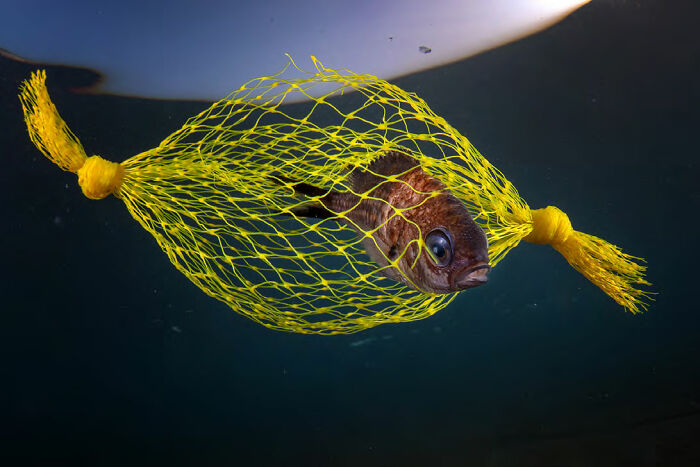
Image credits: Pasquale Vassallo
#21 ‘Jellyfish Galore’ By Oleg Gaponyuk (Russian Federation), 3rd Place In ‘Wide Angle’
“In March 2020, I flew to Palau for two weeks of diving. When I was there, the borders closed because of Covid-19, so I was able to fly back only after 3 months.”
“It was a good time. Dive sites where you could previously meet 50 people, I visited alone.”
“I have been to the jellyfish lake 4 times. Usually, a snorkeling session lasts 45 minutes due to the large number of tourists. But as I was alone, I could swim for 3-4 hours.”
“Before the first dive, the guide told me: swim to the center of the lake, there you will see jellyfish. In the center, I found only a dozen jellyfish and was upset.”
“The second time I took a drone with me and quickly flew around the entire lake. 2 million jellyfish, about which I read in Wikipedia, gathered in a small group near the shore at the far end of the lake, which was about 500 meters away.”
“I took the camera and swam. I had to work with fins for 20 minutes until I ended up in real jellyfish soup. That’s where I shot this panorama.”
Jellyfish Lake, Palau
Canon, EOS 5D Mk 1V, Nauticam, Canon EF 8-15mm, iso 800, f16, 1/125, 8 shot panorama
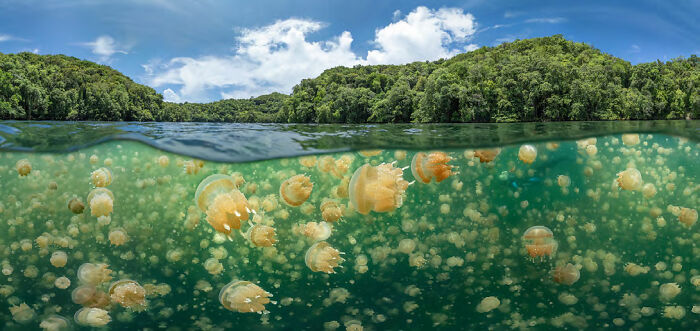
Image credits: Oleg Gaponyuk
#22 ‘Pinky’ By Sandra Stalker (United Kingdom), 3rd Place In ‘British Waters Compacts’
“I absolutely adore these little Gobies and their grumpy faces. I often watch them when I dive as they have such an inquisitive nature and often challenge me to a staring contest in which they win. They tend to blend in with their background on the sand and I wanted to make the Goby stand out so for this shot I lit it with both a coloured filter behind and a snooted strobe in front to bring out the face and draw attention to an overlooked little fish. I was excited by the contrast of the vibrant pink to the glumness of the face.”
Portland harbour, Dorset, England (MBY)
Canon, G7Xii, Ikelite, CMC1, iso 250, f/8, 1/125, Backscatter mini flash with snoot x 2
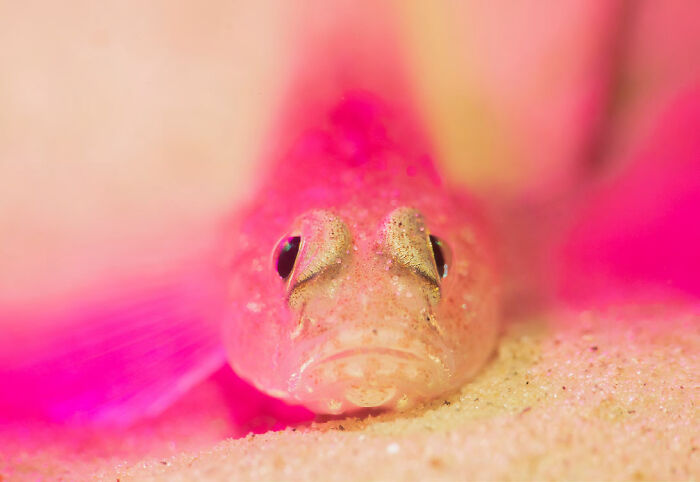
Image credits: Sandra Stalker
#23 ‘Doule Near The Surface’ By Jack Berthomier (New Caledonia), 1st Place In ‘Compacts’
“I used to go fishing in the river to take some shots a few days after big rains which make the riverbed go higher and make some big floods. The current is strong but still practicable for freediving with dislodged plants, leaves and branches. They bring a lot of color which showcase this plain New caledonian carp (Kuhlia Rupestris) which are common in our rivers.”
Ouenghi River, New Caledonia
SONY, RX100, ISOTA, Wide angle INON UW-H100, iso 200, 5.6, 1/800, Internal flash
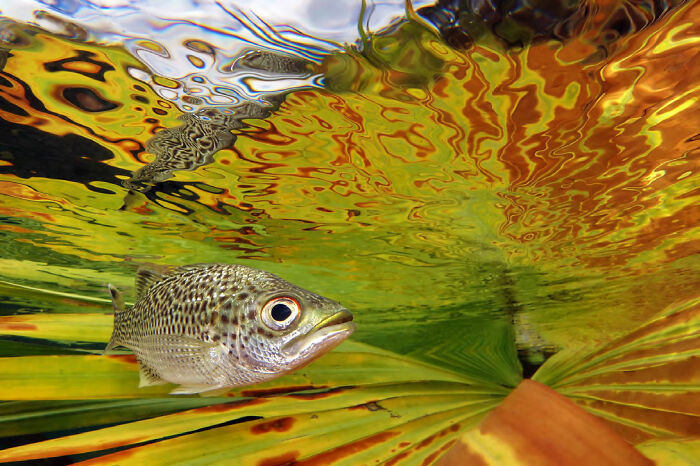
Image credits: Jack Berthomier
#24 ‘While You Sleep’ By Mark Kirkland (United Kingdom), 1st Place In ‘British Waters Wide Angle’
“Malls Mire – small woodland in Glasgow, between a housing estate, supermarket and factory – is an unlikely haven for wildlife. As winter thaws, for a few nights each year one of it’s small muddy ponds comes alive with Common Frogs. I first photographed them here in 2018 and since that day I’ve had this image in my head. It took another two years before I captured the little wonders that stir in the cold nights while the city sleeps. Using a temperamental remote shutter while combining long-exposure, backlighting, close-focus wide angle and split photography meant I had to abandon any frustrations and try (and inevitably fail) for the hundredth time to get it right. This final shot is a culmination 25 hours over 4 nights of lying in darkness, covered in mud,
waiting on natures unpredictable elements to align. Time well spent? Absolutely.”
Malls Mire, Glasgow, Scotland (MBY)
Olympus , OMD Em5 MKii, Olympus PT-EP13, Panasonic 8mm Fisheye, iso 1000, f16, 20s, 2x Sea and Sea YS-110a
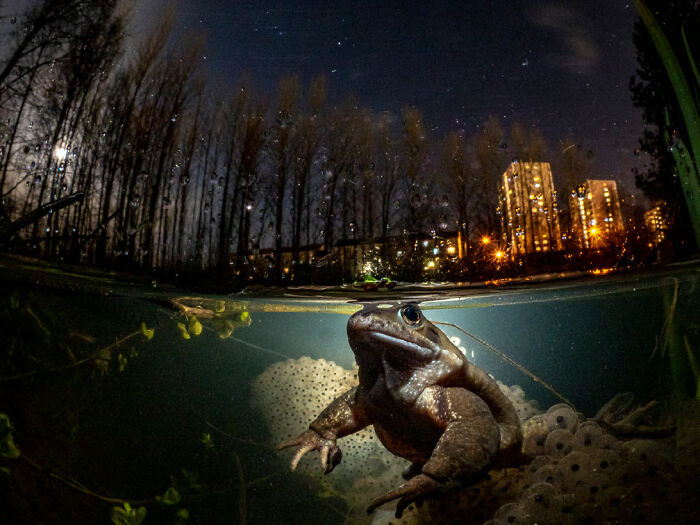
Image credits: Mark Kirkland
#25 ‘Larval Lionfish’ By Steven Kovacs (United States), 2nd Place In ‘Macro’
“Drifting near the surface at night in over 700 feet of water, I came across this one inch larval Lionfish off the coast of Florida during a blackwater dive. In the Atlantic Ocean, Lionfish are an invasive species and, unfortunately, finding the pelagic larvae is an all too common occurrence during these dives. This individual was exhibiting more beautiful coloration than usual and so I set out to try and capture its fins in full display. It’s a challenging task, not only because they shun bright lights and usually try to flee, but also because they fully flare their fins in a defensive posture very sporadically and only for brief moments of time. I was very fortunate to be able to capture this particular individual in all its glory.”
Palm Beach, Florida, United States
Nikon, D500, Ikelite, 60mm macro, iso 250, f/25, 1/350, dual Ikelite DS160 strobes
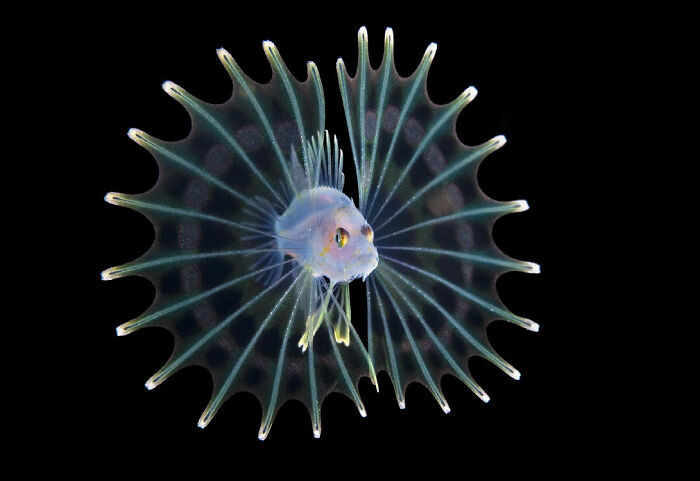
Image credits: Steven Kovacs
#26 ‘Toward Shining Light’ By Ryohei Ito (Japan), 2nd Place In ‘Up & Coming’
“As we were mooring the safari boat in the lagoon at night, Manta rays came behind the boat to eat the plankton that gathered in the light of the boat so I put on my snorkel and fins and went into the sea with my camera.”
“This Manta ray, which preys on plankton, repeatedly flipped in front of me and went deep into the water. The appearance of the giant dancing in front of me was a masterpiece. Watching the situation up close, I was absorbed in releasing the shutter. This photo was taken aiming at Mantaray rising from the depths toward the light on the surface of the water.”
Maaya Lagoon , North Ari Atool, Maldives
Canon, 5D Mark4, SEA & SEA MDX-5D MARK 4, EF8-15mm F4L fisheye USM, iso 400, f16, 1/200, RETRA FLASH PRO x2
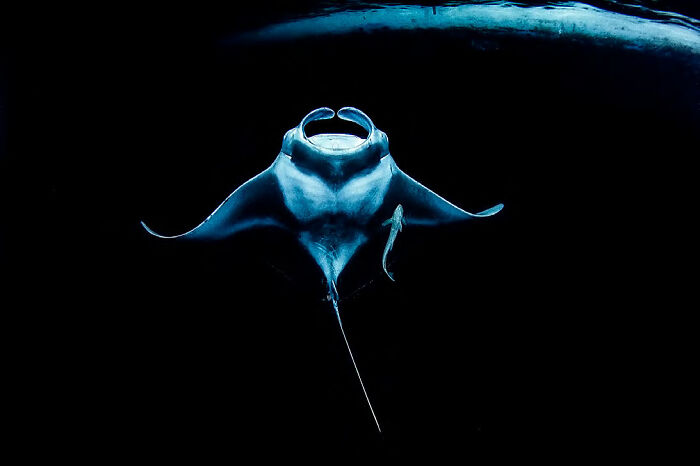
Image credits: Ryohei Ito
#27 ‘Crab Affairs’ By Atanas Petrov (United Kingdom), 2nd Place In ‘British Waters Living Together’
“During a dive on the SS Rosalie, a wreck off the coast of Weybourne in England, I noticed these two brown crabs (Cancer pagurus) occupying a groove in one of the supporting elements of the propeller shaft. They have probably completed an important part of their life cycle – the mating, and the male on the top was protecting the female underneath until her exoskeleton hardens. I was pleased to witness and capture this special behaviour using my wide-angle lens, which allowed me to include part of the surrounding environment as well.”
SS Rosalie, Weybourne, England, UK (MBY)
Nikon , D300, Subal ND7100, Tokina fisheye lens 10-17mm, iso 200, f/13, 1/25, Dual Inon Z-240
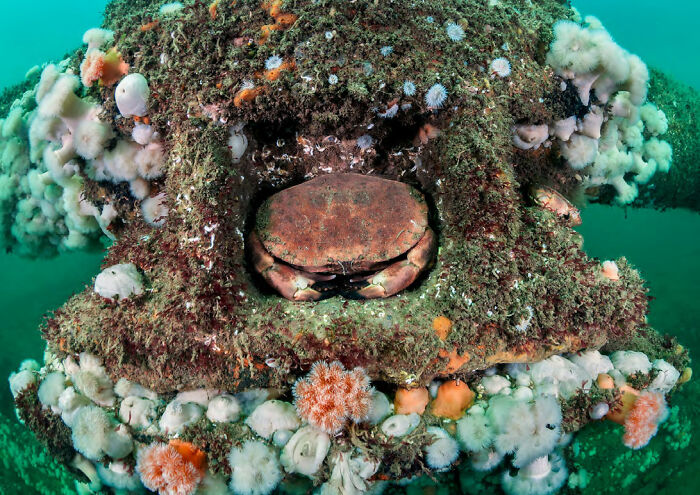
Image credits: Atanas Petrov
#28 ‘Hold Tight’ By Sandra Stalker (United Kingdom), 2nd Place In ‘British Waters Compacts’
“Within my underwater photography I am always excited by the tiny and overlooked, mostly focusing on macro and getting as close as I can to my subject. On this day last Summer the conditions were perfect, calm sea, clear viz and fantastic underwater scenery meant it was like diving through a spectacular underwater meadow. There were so many tiny Stalked Jellyfish clinging to the bootlace weed. The ambient light was stunning, sunshine beaming through the long strands of bootlace. For this shot I went much wider than normal and used the ambient light to almost silhouette the tiny Stalked Jellyfish, emphasizing its tiny shape against the naturally lit background.”
Kimmeridge bay, Dorset, England (MBY)
Canon, G7Xii, Ikelite, non, iso 125, F10, 1/200, backscatter miniflash
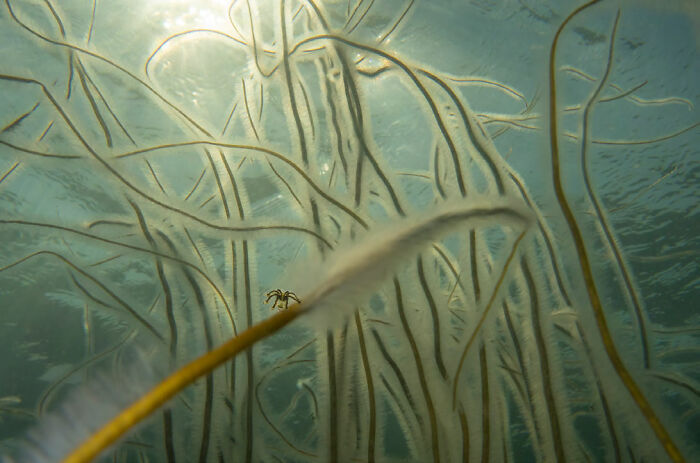
Image credits: Sandra Stalker
#29 ‘Golden Hour At The Georgios’ By Renee Capozzola (United States), 3rd Place In ‘Wrecks’
“This split shot of the Georgios shipwreck was taken in Neom, Saudi Arabia along the Gulf of Aqaba in the Red Sea. In 1978, this large cargo ship originally from England became stranded on a shallow coral reef at night and then suffered from a large fire. Now serving as an artificial reef for many marine organisms, this wreck sits halfway out of the water on the bow side and in roughly 80 feet of water on the stern side. Some locals refer to this site as the “Saudi Titanic.” To achieve this photo, I used a very small aperture, an extremely wide rectilinear lens at 12mm, a lower ISO, and strobes to light the coral underwater.”
Neom, Saudi Arabia
Canon, 5D Mark III, Nauticam, Canon 11-24mm, iso 200, f20, 1/160, Dual Sea & SeaYS-D2’s
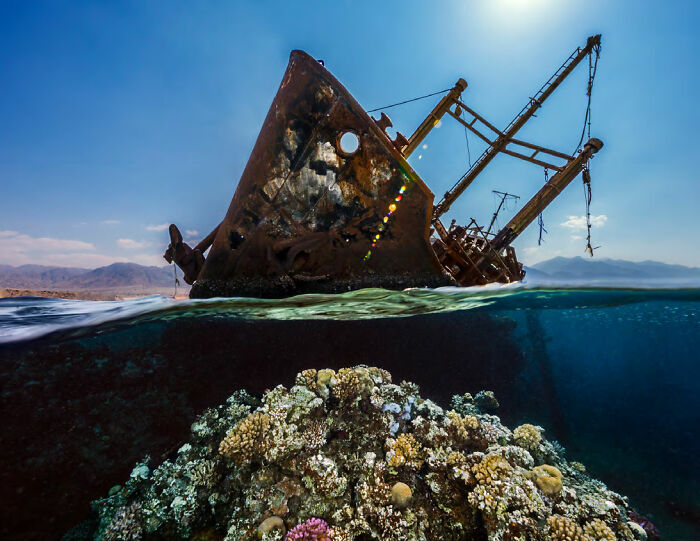
Image credits: Renee Capozzola
#30 ‘French Angel’ By Michael Gallagher (United Kingdom), 3rd Place In ‘Portraits’
“I took this portrait of a gorgeous French Angelfish whilst scuba diving at the legendary Salt Pier in Bonaire in the Caribbean. Luckily for me, two key elements combined together so that I could snap this intimate portrait of one of my favourite fish – firstly, my subject was somewhat familiar with divers already and not afraid to face the camera, and secondly, I was able to exploit the shadows under the pier itself to create a dark background which helped highlight the exceptional beauty of this particular fish.”
Salt Pier, Bonaire
Canon, 5D3, Hugyfot, Canon 2.8f IS 100mm Macro
Lens, iso 400, f16, 1/200s, 2 x Inon Z240 strobes
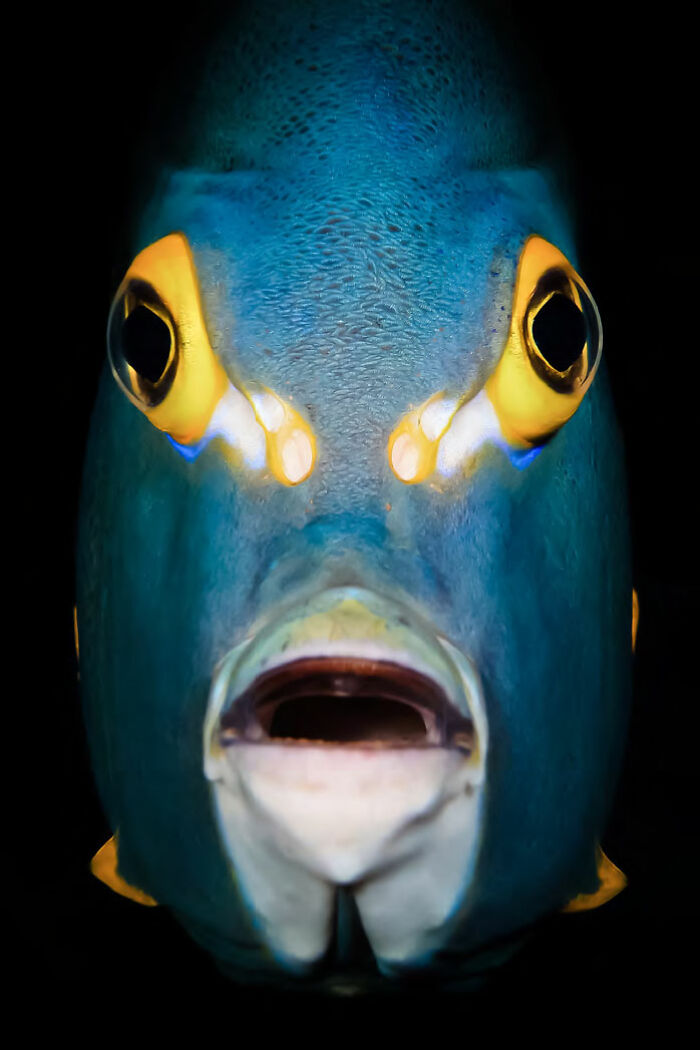
Image credits: Michael Gallagher
#31 ‘Pelagic Stingray (Pteroplatytrygon Violacea)’ By Isaías Cruz (Spain), 3rd Place In ‘Compacts’
“This image was taken in summer, offshore from Bermeo, while doing a shark dive. Being sorrounded by 3 blue sharks, this pelagic ray appeared to check the bait. It was a very rare encounter, this animal was not been sighted before in this waters, and I too had never seen this animal before. It was going in and out from the bait, so I tried to get close to it calmly, then it come right to my dome and I took the photo.”
Basque Country, Spain (MBY)
Sony, RX 100 V, Nauticam NA-RX100V, Inon UWL-H100 + dome, iso 500, f/5, 1/160, x2 glowdive max lights
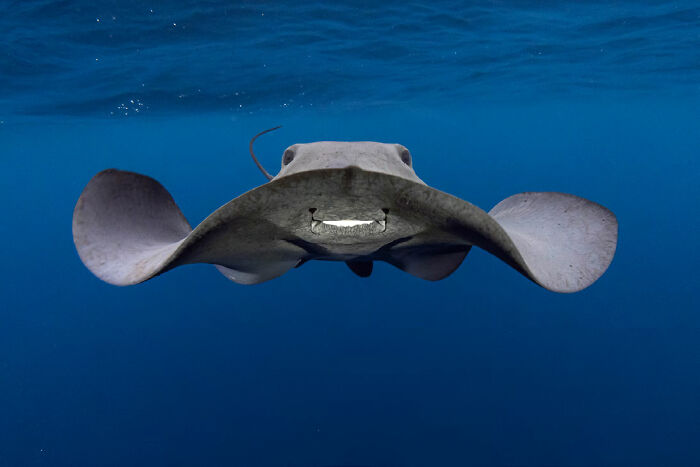
Image credits: Isaías Cruz
#32 ‘Resplendence – Black Browed Albatross’ By Danny Lee , Tasmania (Australia), 3rd Place In ‘Up & Coming’
“Whenever I see an Albatross I get excited! Their sheer size and beautiful features make them a joy to photograph. I have been working on a series of split shots of the various species of Albatross that visit Tasmanian waters for a few years now. Getting good eye contact as well as good feet symmetry is a challenge as they are generally quite shy Birds. I use a very simple inexpensive compact camera and do not use a wide angle dome or wet lens when taking these photos. The small 6cm flat Port on my housing may be small but works a treat in calm conditions. Getting the exposure settings right is the important part because the Albatross’ feathers are so brilliantly white, and yet it can be reasonably dark underwater.”
Bay of Fires, Tasmania. , Australia (MBY)
Canon, G7x mark II, Meikon Canon G7x, N/A, iso 160, f/8.0, 1/125, Natural light only
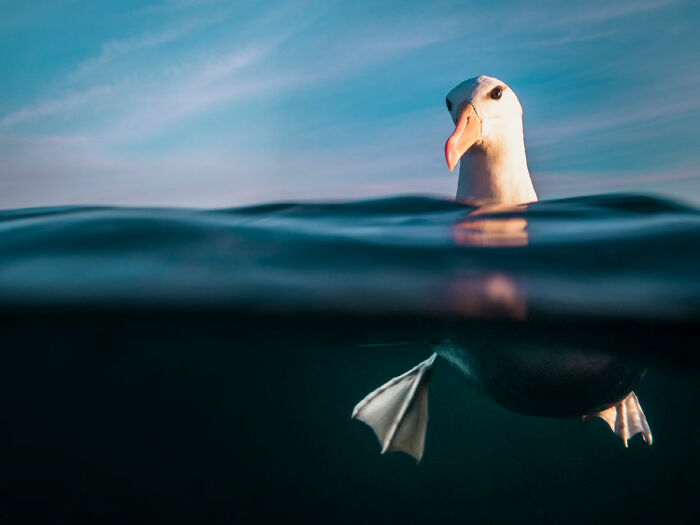
Image credits: Danny Lee
#33 ‘Pontoon Island’ By Dan Bolt (United Kingdom), 3rd Place In ‘British Waters Living Together’
“Anchored in a sheltered inlet on Loch Carron, western Scotland, this floating pontoon is used by local fishermen to stow their gear when not being used. It’s been there for some years and is now a floating island of life.”
“The anchor lines are a vertical forest of seaweeds, ascidians ad fan worms, while the underside of covered with anemones and
sponges.”
“This was a very lucky shot, as it was taken during the only 15 minute period when the sun came out on a 7 day trip!”
Loch Carron, UK
Olympus, OM-D E-M1, Aquatica AE-M1, Olympus 14-42mm with Nauticam WWL-1, iso 640, f/16, 1/320, 2 Sea & Sea YS-D1
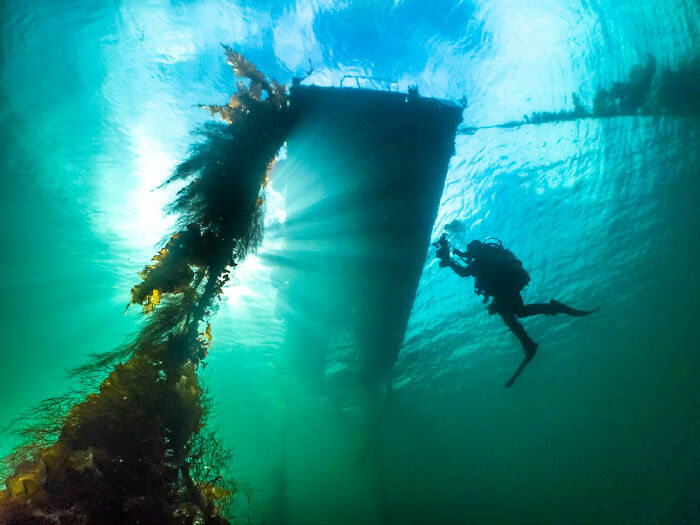
Image credits: Dan Bolt
#34 ‘A Striped Marlin In A High Speed Hunt In Mexico’ By Karim Iliya (United States), 1st Place In ‘Behaviour’
“This is a terrifying scene for the small fish, fleeing for their lives as a striped marlin hunts them. The slightest mistake means life or death. There are often birds hunting from above and sometimes a dozen other marlin and sea lions attacking from all sides. Marlin are one of the fastest fish in the sea, a terrifying predator for a small fish in the great blue desert. I went to Mexico to document these feeding frenzies but was not expecting such a fast paced hunt, almost too fast for my brain to process. For a brief moment, this scene unfolded before me and I had to rely on all my instincts and practice underwater to take this photo. I used natural light and stayed on the periphery of the bait-ball so as to try and minimize disturbance. Watching wild animals hunt is one of the greatest spectacles in nature.”
San Carlos, Baja, California, Mexico
Canon, 1D X Mark II, Nauticam, 16-35mm f2.8L, iso 1250, f/5, 1/800, None
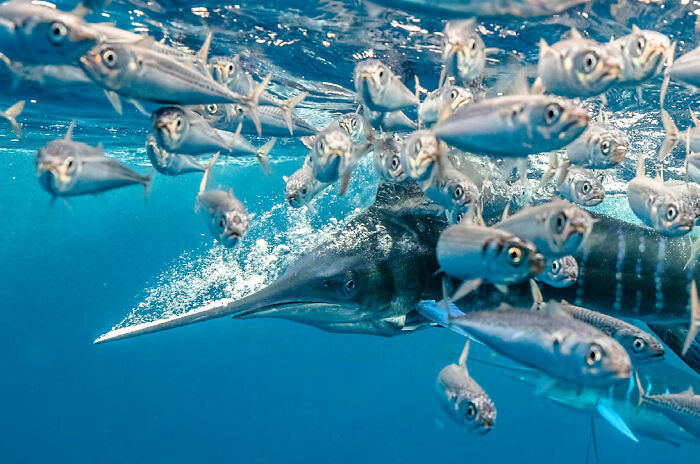
Image credits: Karim Iliya
#35 ‘Aerial View Of A Crowded Island In Guna Yala’ By Karim Iliya (United States), 1st Place In ‘Marine Conservation’
“A tightly inhabited village off the coast of Panama in Guna Yala region serves as a microcosm reminder of how humans across the planet are consuming land and space at a rapid rate. Most of the Guna people live on these densely populated islands, catching fish and farming coconuts on nearby islands. The importance of human’s relationship with nature and the need to protect it is becomes very apparent when you look at our species from a bird’s eye perspective and see how much space we take up. I had come to this region of Panama to photographing the art of making mola, the traditional clothing that the Guna people wear. While waiting on a boat I flew my drone over this island to get this aerial perspective and give more impact to the image than I could have shooting at sea level or from underwater.”
Guna Yala, Panama
DJI Phantom 4 Pro, DJI Phantom 4 Pro, none, 20.7mm, iso 100, f/2.8, 1/500, none
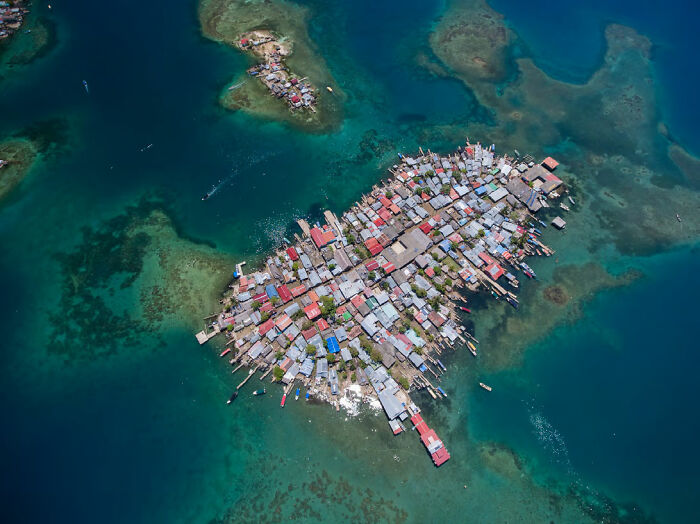
Image credits: Karim Iliya
#36 ‘Japanese Manefish’ By Keigo Kawamura (Japan), 2nd Place In ‘Portraits’
“Japanese manefish is not a fish that can be found by looking for it. It can only be encountered by diving when a perfect tide brings them close to shore. I have dived for 20 years and I took this picture when we met for the first time. Japanese manefish juveniles have mirror-like skin and have a glassy, crystal clear body, so I chose to light it from the back to reveal these characteristics.”
Ose, Japan
Canon, 5DsR, Zillion ZAP-5DsR, EF24-70mm F4L IS USM, iso 400, f/22, 1/200, Sea&Sea YS-D1
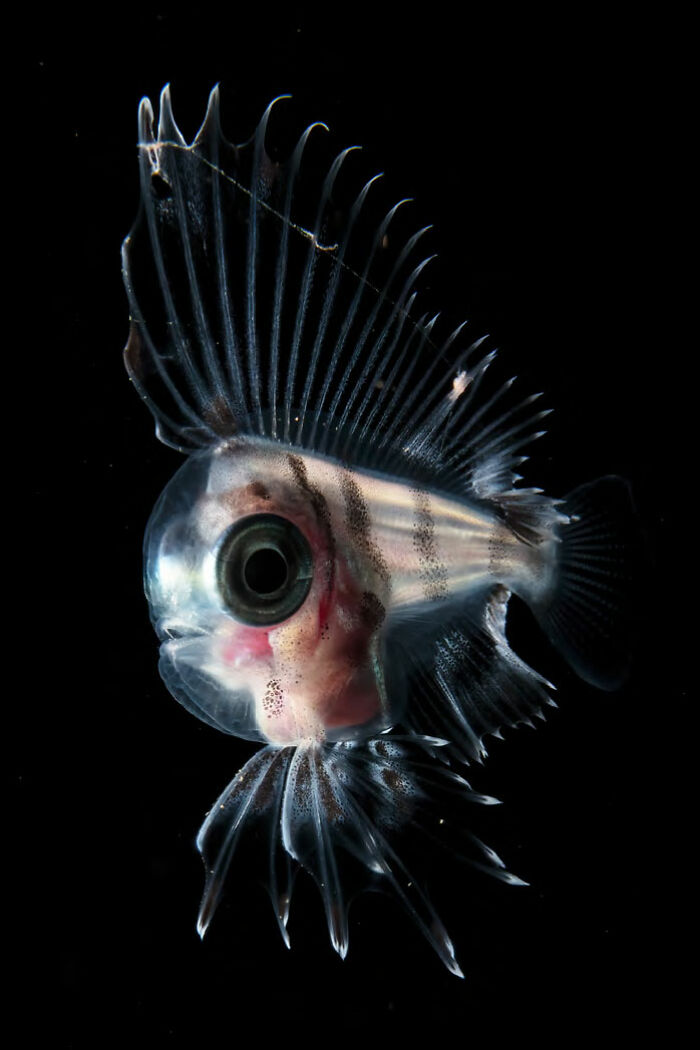
Image credits: Keigo Kawamura
#37 ‘Rainbow Goby’ By Manbd (Malaysia), 2nd Place In ‘Compacts’
“When I was underwater with this Hairy Panda Goby, he was very shy so it took a long time for it to be comfortable before it popped it’s head out. While waiting, I set up my coloured torches and align them to illuminate the coral, but not the goby. Then to produce a sharp picture of the goby I had to use another snoot with white light, so that it is recorded correctly and surrounded by all the colours.”
Lembeh, Indonesia
Olympus, TG4, Olympus PT-056, Inon, iso 200, f/5.6, 1/200, Big Blue Torch
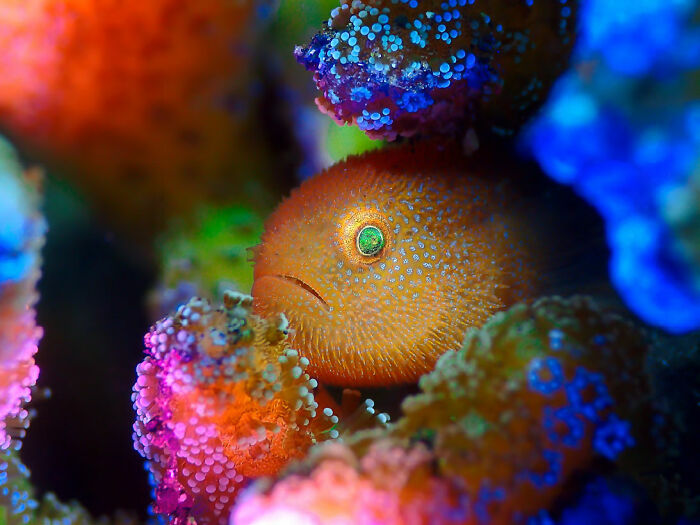
Image credits: ManBd
#38 ‘Stalkie On Bootlace Weed’ By Dr Alex Tattersall (United Kingdom), 2D Placein ‘British Waters Macro’
“A beautiful summer morning in mid- July, we left the beach and swam though beautiful clumps of bootlace weed in the high tide. Looking closer, we could see snails, shells, anemones and stalked jellyfish making their temporary homes among the weeks. Very peaceful moments.”
Kimmeridge Bay, , UK (MBY)
Nikon, D850, Nauticam, 105mm, iso 400, F11, 1/60, 2X Retra Flash Pro with bream restrictors
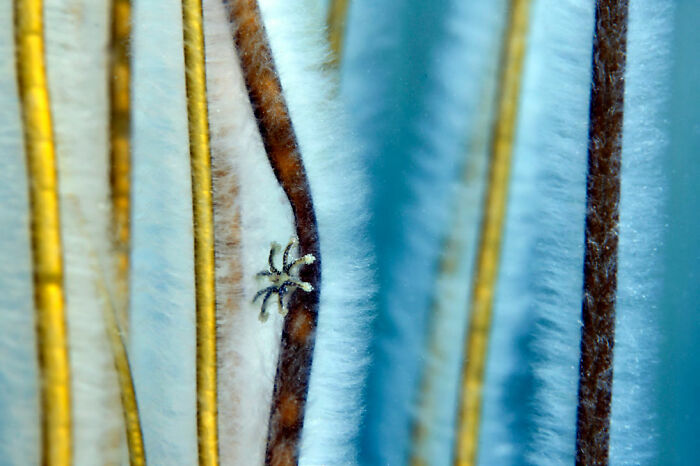
Image credits: Dr Alex Tattersall
#39 ‘Dream Ship’ By Chien-Ting Hou (China), 3rd Place In ‘Macro’
“When I dived at night and saw this jellyfish it looked very cute. It looked like an alien creature had appeared in front of me. It has a lot of tentacles so sometimes looks very messy. But I really wanted to take a picture of his tentacles that are vertical, so I waited for a while and finally took the picture, but when I replayed the picture, I found two bugs on it’s body. They were like taking a spaceship to go traveling in space.”
Anilao, Philippines
Canon , 5D Mark IV, Nauticam NA 5DIV, SIGMA MACRO 50mm, iso 400, f/25, 1/200, INON Z-240
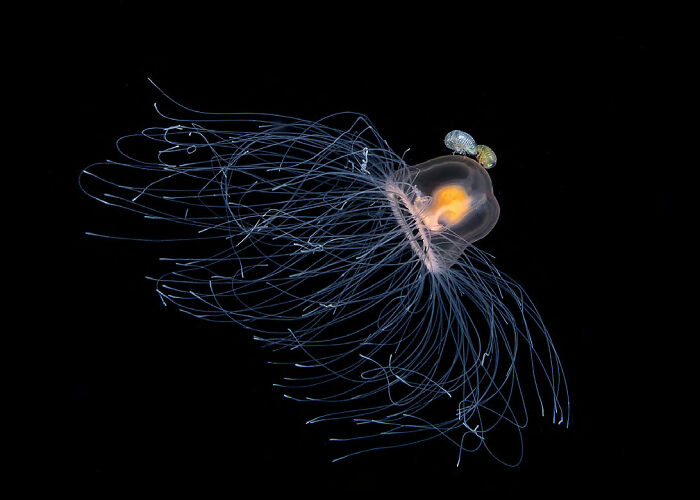
Image credits: Chien-Ting Hou
from Bored Panda https://ift.tt/3u7n9Ux
via IFTTT source site : boredpanda